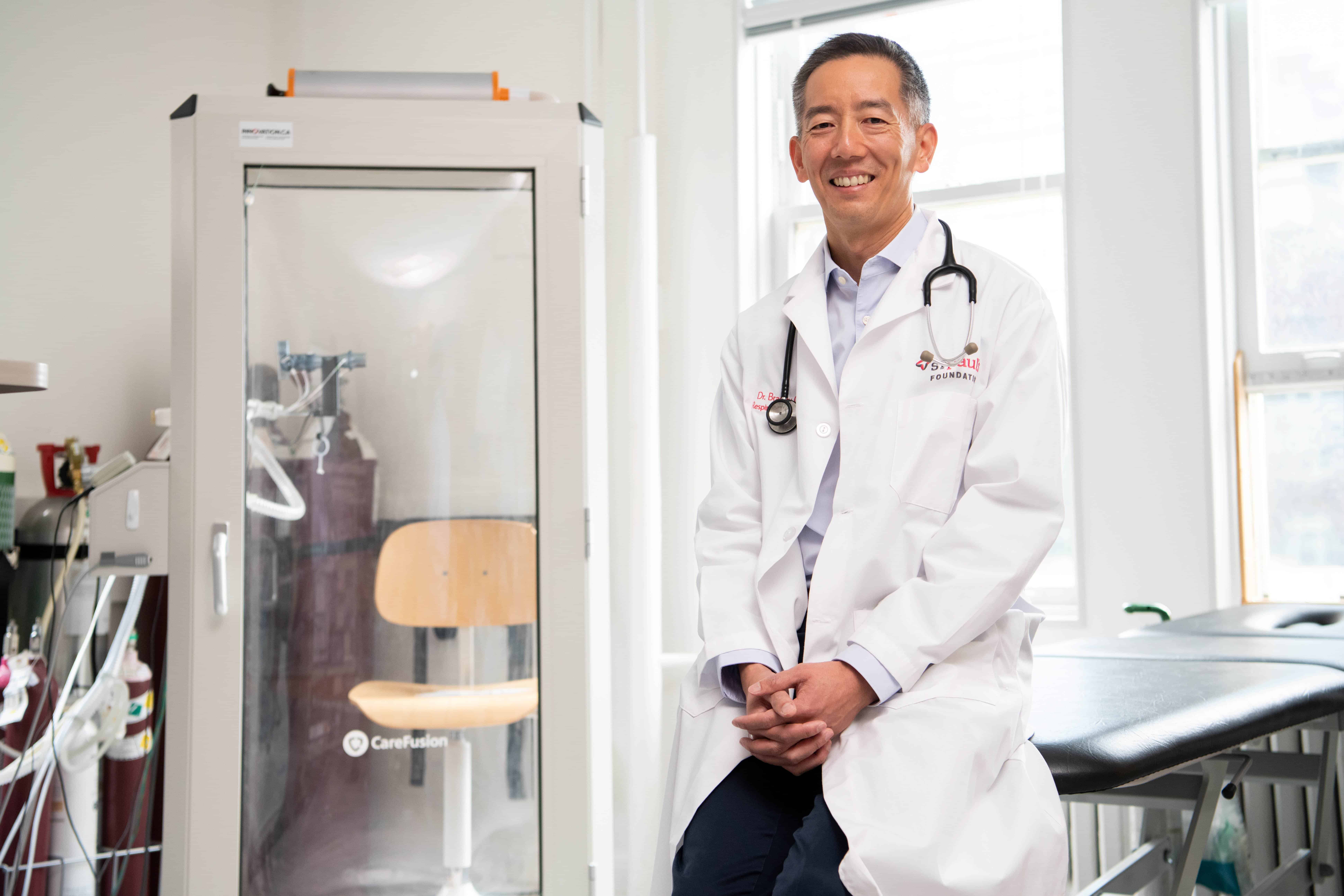“Your support is changing the lives of so many people. Not only my life, but the lives of all the people who love me: my siblings, my mom, my dad, my friends. You can’t really put a price on the impact that this treatment has on people’s lives.”
Trina Atchison, grateful patient living with cystic fibrosis
As a child, Trina Atchison wanted to be a veterinarian. But she never anticipated she’d live long enough to fulfil her dream.
In 1987, at only six months old, Trina was diagnosed with cystic fibrosis (CF) – a genetic, progressive, and fatal disease that primarily affects the lungs and digestive system. At the time, CF was a death sentence: most patients didn’t live beyond their teens.
Trina’s early childhood involved traveling from the Okanagan to appointments in Vancouver, sometimes staying for weeks at a time in the hospital on her own when her mother needed to return home for work. Once she reached her teenage years, Trina started receiving treatment at St. Paul’s Hospital, the provincial centre for adult patients with CF.
At 10 years old, Trina recalls finding a newspaper clipping featuring her family and their cystic fibrosis journey. She read, for the first time, that she wouldn’t celebrate her 12th birthday.
“It was hard to digest that there was an expiry date on my life,” she says. “And that really had a very profound effect on my mental health. I started to have a better understanding of my own mortality and what cystic fibrosis does long term: the older you get, the sicker you get.”
From surviving to thriving
But Trina’s ‘expiry date’ kept changing.
Due to medical advancements, Trina’s life expectancy shifted to 15 years old. Then 18. Then 21. Then 30.
During this uncertain period in adolescence and young adulthood, Trina struggled with depression alongside a determination to live life to the fullest at every moment. She hid CF from all her friends, so she would never be viewed as ‘the sick girl’. After high school graduation, she worked a collection of odd jobs because she didn’t see the point of investing in university or a long-term career.
“The jobs I chose weren’t ones I had passion for because I really didn’t know how long I was going to be around,” she says. “I was just here for a good time, not a long time.”
For people living with cystic fibrosis, the lungs don’t clear secretions properly and mucus accumulates – causing infections and scarring. It can be so difficult to breathe that a patient can feel like they’re drowning. Over time, the lungs become so damaged they don’t work anymore, requiring transplantation – that is, if a new set is available.
Eventually, Trina couldn’t hide her CF anymore.
As she reached her late 20s, her lung function dropped dramatically. Holes in her lungs made her cough up blood. Since she was in the hospital every week or two, she couldn’t keep a job – ultimately, her doctors recommended she go on long-term disability. She barely left her house in Vancouver.
“I couldn’t even walk up my back steps. I couldn’t go get groceries,” she explains. “I was at a point where I was afraid that if I left, I wouldn’t be able to make it home.”
Helping patients breathe again: Dr. Bradley Quon and Trikafta
St. Paul’s Hospital is home to the largest adult cystic fibrosis clinic in the province, and its clinicians are working on a cure for this challenging disease. Every year of research adds a year of life to the patients living with this condition. Thanks to modern therapies, patients are living full lives; many live to be seniors.
And doctors like Dr. Bradley Quon are paving the way for better, life-changing treatments – and an eventual cure.

Dr. Quon is a clinician-scientist, the medical director of the CF Adult Care Program, and a researcher at the Centre for Heart and Lung Innovation. In 2018, St. Paul’s became a clinical trial site for a new drug called Trikafta. At that time, the drug was in phase three of development, which is the last phase before approval from Health Canada.
After returning from a trip with her boyfriend in the summer of 2018, Trina once again landed in the hospital, where her nurse begged her to apply for the Trikafta trial.
“I was just at the point where I felt that I had nothing to lose. It couldn’t get any worse,” she says. “I’d never done any trials before. And it was mind blowing how life changing it’s been.”
Trina was a prime candidate for the Trikafta trial. Since the study was double-blind, she didn’t know if she would receive the placebo or the real medication. After a few days, she noticed a rapid change in her body (what she lightheartedly refers to as a ‘gross purge of mucus’).
Two weeks later, she was back at the CF clinic for a lung spirometry test, which assesses lung function. On a good day prior to Trikafta, Trina’s lung function was around 63%.
“I remember my research person looked at the numbers, and I wasn’t allowed to see them. She just started to cry,” Trina recalls. “I was like, ‘I got the real thing, didn’t I?’ She said, ‘I don’t know’. And I said, ‘I know, I can feel it. I know I did’.”
She later learned her lung function had leaped to 87%.
Two months afterward, Trina walked into the lung clinic and her longtime respirologist didn’t even recognize her.
“I went from being so sick and decrepit to gaining 30 pounds, being able to walk and breathe, and not gasp for air,” she says. “He walked right past me, and then stopped. He asked, ‘Trina?’ and I went, ‘Hi’. He said, ‘Oh my God’. And it was just the most amazing thing.”
Life with Trikafta: advocacy, mental health, and planning for the future
The Trikafta drug trial showed a dramatic improvement in patients’ lung function and quality of life, as well as reduced hospitalizations. In 2022, the drug was approved by Health Canada and has continued to enhance thousands of lives across Canada.
Trina describes the years since beginning Trikafta as some of the best of her life. She hasn’t been hospitalized. She’s engaged. She can travel, breathe, live. And she’s finally able to pursue her childhood passion as a career: she’s a veterinary assistant at a Vancouver animal clinic.

“Working with animals just feels right. I’ve never experienced a job or a career that felt like me,” she says. “That’s been really exciting, and I wouldn’t have been able to do the things I’ve been able to do without Trikafta.”
Trina spent most of her life planning her funeral. Now, she’s able to plan for her future.
Yet she recognizes this is a mixed blessing for her and many other patients living with cystic fibrosis. There is joy in experiencing good health, but also fear and anxiety about the many unexpected, unknown years ahead.
“We’ve planned for death our whole lives. We never planned to have a retirement, or grow old with somebody,” she explains. “You don’t plan for all the amazing things that other people think about as they get older. Our whole lives, everyone’s fighting for our physical health, but no one thinks about the toll it takes mentally and emotionally.”
Trina is now a fierce advocate for mental health in cystic fibrosis spaces, so no one feels isolated or alone. She also speaks to parents of children with CF to inspire them with all the future possibilities.
Trikafta was life-changing for Trina. Initially, she felt what she calls ‘survivors’ guilt’ for receiving early treatment. So she also joined in advocacy efforts to improve access to Trikafta in BC and throughout Canada.
The impact of research – and equity
Trikafta is a transformational drug, but it’s only approved for people with certain types of CF. It’s been shown to be effective for 85-90% of patients with the most common CF mutations. While Trikafta has the potential to work for the remaining 10-15%, patients with rarer mutations weren’t included in the original trial.
That means Trikafta – a treatment that costs upwards of $300,000 – isn’t covered for that smaller group of patients who want to try it.
“We’re trying to close that gap and make sure that no one is left behind,” says Dr. Quon.
Dr. Quon’s next stage of research takes nasal cells from patients and grows them in the lab. Then, he applies Trikafta to see how those cells respond to treatment. His findings could broaden access to the drug, and pave the way for future solutions in cases where Trikafta isn’t effective.
“Ultimately, we want to make CF stand for ‘cure found’,” he says.
As someone who wasn’t expected to celebrate her 12th birthday, Trina knows first-hand how important research and medical advancements are to patients and their families.
“I wouldn’t be here if it weren’t for research, and a lot of patients with cystic fibrosis wouldn’t have made it this long without it,” she says. “I really wasn’t able to live before Trikafta, and all the people behind it. You can’t really put a price on the impact that this has on people’s lives.”
